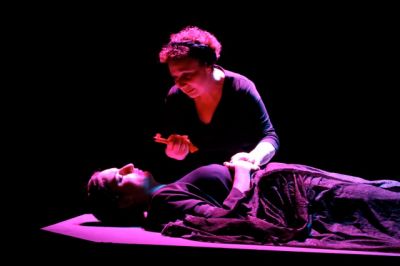The Tragedy of Lucrece
This new work is loosely based upon Shakespeare’s narrative poem the Rape of Lucrece. Set in Rome, 500 BC, we find the arrogant Prince Tarquin and his nobleman friend Collantine discussing women in general, and in particular Collantine’s wife Lucrece, whose virtue and modesty is famed throughout Rome.Prince Tarquin believes all women are immoral, and sets out to prove it by raping Lucrece.
Lucrece, who in this society is high status but powerless, must allow the men in her life (husband, father) to speak on her behalf and she becomes increasingly guilt ridden as these same men question her innocence in the rape. As the rape becomes less about her in their eyes and more about the political ramifications for Rome, she exercises the only bit of control she feels remains to her, and this results ultimately in the overthrow of the King and the installation of a republic.
The behavior of the men in this tragedy is unfortunately still being repeated in real life so this subject matter is very relevant to today’s audience. While the style of writing is dense it is very accessible. There were layers of meaning and wordplay reminiscent of the Bard himself. The work certainly felt that it had gravity that comes with age.
Performances varied across the ensemble with the older actors appearing more comfortable with their roles, or perhaps with less lines to remember there was less pressure. Jamaica Zuanetti as Lucrece, dealt well with the transition from secure high-ranking woman to self-doubt and despair. Sebastian Bertoli as her husband Collantine was suitably wavering, being initially supportive of his wife then swayed by the doubt sewn by the Prince. Liam Gillespie as the Prince relied on his swagger and loud voice and we never saw behind the arrogant façade.
 As is often the case with Fringe Festival performances, staging was very basic: in this case an empty stage and a rostrum pushed on twice to become an acting platform and later a bed for Lucrece. The rear black tabs were parted slightly in the centre to allow projection of various roman scenes and, during the rape scene, a montage of images from classical paintings of the Rape of Lucrece to current day media shots highlighting sexual assaults from around the world including our own recent high profile cases.
As is often the case with Fringe Festival performances, staging was very basic: in this case an empty stage and a rostrum pushed on twice to become an acting platform and later a bed for Lucrece. The rear black tabs were parted slightly in the centre to allow projection of various roman scenes and, during the rape scene, a montage of images from classical paintings of the Rape of Lucrece to current day media shots highlighting sexual assaults from around the world including our own recent high profile cases.
While the women's costumes were plain, they evoked the period, but the costumes for the men were black or dark street clothes with no distinction for character or status, and the dark clothes against the black curtains were dull. Some simple accessories on the men such as a toga-like sash, or jewellery on the Prince and King, would have helped lift the show visuallyand look less like a rehearsal.
The lighting had the actors moving in and out of shadowmuch more than was dramatically necessary, and there was a lot of spill from the FOH lanterns at times. There was the occasional sound effect but they contributed little to the play.
This performance felt more like a workshop staging of this work rather than a world premiere and it deserves further staging with a decent budget to allow a more supportive lighting, sound, and costume/set design.
Shirley Jensen
Images: (top) Brutus (Paul Dawber) directs his eulogy to Lucrece (Jamaica Zuanetti) to the Roman people and (lower) Bianca (Josie Eberhard) discovers Lucrece's (Jamaica Zuanetti) corpse.
Subscribe to our E-Newsletter, buy our latest print edition or find a Performing Arts book at Book Nook.

